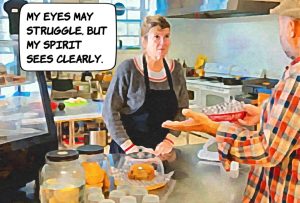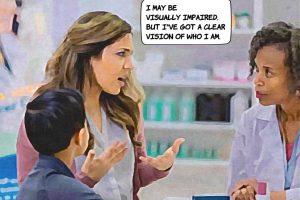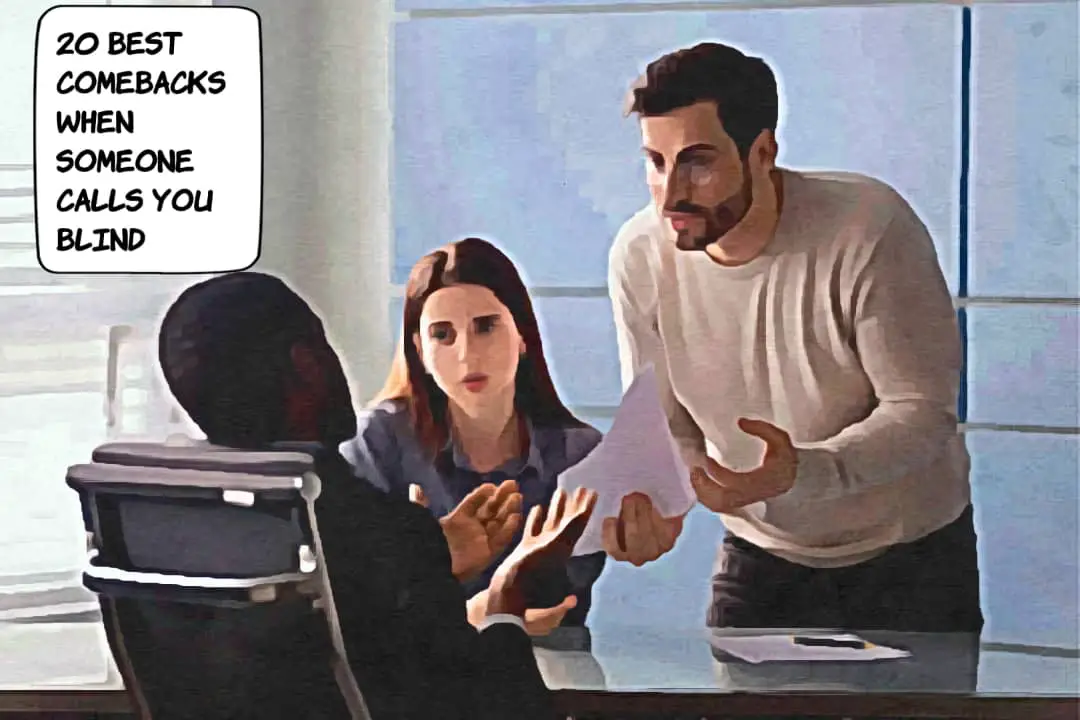You stumbled against someone in the hallway or on the street and they yell at you about being blind.
If you have not experienced this, maybe you’ve seen someone call out at someone, “What, are you blind?”
This article presents the 20 best comebacks when someone calls you blind. Now you don’t have to walk away glumly again.
Dig in.
20 Best Comebacks When Someone Calls You Blind
1. At least my vision isn’t as impaired as your judgment.
This comeback points out that the person’s judgment is flawed for making such a remark is a clever way of pointing out that the person’s judgment, or their ability to make good decisions or assess situations accurately, is more flawed or impaired than your vision.
It’s a play on words that suggests while your vision may be physically impaired, their judgment is impaired in a metaphorical sense, meaning they might be making poor decisions or judgments about you or others.
- Maybe you need glasses for your judgment, too.
- I may be blind, but I can see through your insults just fine.
2. I may not see perfectly, but I can see through your lies.
This comeback suggests that despite any visual impairment, you’re still capable of seeing dishonesty.
It is a comeback that suggests despite any physical limitations in your vision, you’re able to discern when someone is being dishonest or deceitful.
Use this if the situation is one where someone is trying to pull the wool over your eyes.
- My sight might be blurry, but your intentions are crystal clear.”
- Blindness hasn’t stopped me from seeing the truth about you.”
3. My eyesight might be lacking, but my insight isn’t.
This is a comeback that highlights the distinction between physical sight and inner understanding.
Your insight, or ability to perceive and understand situations, people, and circumstances, is strong.
The person who calls you blind probably wants to shame you. Focusing on insight rather than eyesight takes the conversation higher.
- I may not see well, but I see through people like you.
- Even with poor vision, my insight surpasses yours.
4. Call me visually impaired, but you’re morally impaired.
This comeback shifts the focus from any perceived physical impairment to the person’s character or behavior.
It is a comeback that contrasts physical impairment with moral deficiency.
In this response, you’re acknowledging any visual limitations attributed to you but pointing out a perceived flaw in the character or behavior of the person who insulted you.
- I’d rather be blind than lack empathy like you.
- I can fix my eyesight, but can you fix your lack of decency?
5. Better to be blind than to be blind to one’s own faults.
This one suggests that ignorance of one’s flaws is worse than physical blindness.
This is a comeback that plays on the double meaning of the word “blind.” In this context, it suggests that it’s preferable to be blind than to be ignorant or unaware of one’s own flaws and shortcomings.
Use this comeback in a situation where it is clear the other person is at fault.
- I may not see well, but at least I see myself for who I am.
- Blindness is temporary, but your ignorance seems permanent.
6. Your own lack of vision goes deeper though.
This comeback slaps hard. It can be used if the person attacks you in an undignified manner.
The comeback implies that the person lacks understanding or insight beyond physical sight. This is a comeback that cleverly plays on the dual meaning of “vision.”
While it acknowledges any physical impairment you may have, it also suggests that the person you’re responding to lacks insight, understanding, or foresight in a broader sense.
Use this one when in a meeting and you think the other person is missing an important point.
- My eyesight might be weak, but your understanding is weaker.
- I may not see clearly, but at least I see through your facade.
7. You focus on my eyesight, I’ll focus on my hindsight.

Here’s a thought provoking comeback for anyone who calls you blind. It emphasizes the importance of learning from past experiences rather than dwelling on a bad eyesight.
This comeback cleverly contrasts “eyesight” with “hindsight.” In this context, “eyesight” refers to your physical ability to see, while “hindsight” refers to understanding and reflection gained from past experiences.
- While you’re fixated on my eyes, I’m focused on my lessons.
- My hindsight is 20/20 even if my eyesight isn’t.
8. I’d rather be blind than lack the vision for kindness.
This comeback is for when the person is very rude when they call you blind.
You’re telling the person that moral or emotional vision is more important than physical sight.
This comeback shows the significance of empathy, compassion, and moral vision in one’s character and interactions with others. Things the rude person does not know about and need to work on.
- I may not see well, but I see the importance of kindness.
- My eyes may fail me, but my heart sees clearly.
9. Even if I’m blind, it doesn’t define me, but your ignorance defines you.
This powerful comeback asserts that one’s character and actions are more important than any physical impairment.
In this context, “blindness” refers to a physical condition that may affect one’s ability to see, but the statement asserts that it doesn’t define your entire identity or worth.
On the other hand, “ignorance” refers to the lack of knowledge, understanding, or awareness, particularly in relation to the situation at hand. The other person is sure to reflect deeply on this comeback.
- My vision doesn’t determine my worth, but your words reveal yours.
- I may have poor eyesight, but I have a clear conscience.
10. Though I’m not blind, you lack the vision to see beyond appearances.
This is a comeback for someone who calls people blind all the time. Maybe when they walk into him or they don’t see things from his own point of view.
This comeback points out the importance of seeing beyond physical attributes.
By using this comeback, you’re subtly pointing out that the other person’s lack of depth in perception is a more significant shortcoming.
- My eyes may not work well, but my mind sees beyond superficiality.”
- I might be blind, but at least I can see people for who they are.”
11. My vision may be impaired, but my perspective is crystal clear.
This comeback highlights that despite what the person thinks about your eyesight, your understanding and viewpoint remain sharp.
It is a statement that contrasts physical sight with mental clarity and understanding.
By using this comeback, you’re asserting that your value and worth as an individual go beyond your physical abilities.
It’s a way of emphasizing the significance of mental clarity, understanding, and perspective in navigating life’s complexities.
- Blindness hasn’t clouded my judgment like it has yours.
- I may not see well, but I see through your negativity.
12. Being blind doesn’t stop me from seeing your true colors.
This one suggests that despite visual impairment, you can still discern someone’s real intentions or personality.
This comeback doesn’t necessarily suggest you are physically blind. It only makes the argument from the point of view of the other person.
Overall, this comeback asserts that your capacity to understand and judge others goes beyond mere physical sight, highlighting the depth of your perception and insight.
- My eyesight might be blurry, but your intentions are clear as day.
- Even with poor vision, I can see through your facade.
13. I may not have 20/20 vision, but I’ve got a 20/20 mind.
You may have walked into the person. Perhaps because your vision is impaired. In this comeback, “20/20 vision” refers to normal visual acuity, where someone can see clearly at a distance of 20 feet.
By saying that you may not have 20/20 vision, you’re acknowledging any limitations or imperfections in your physical eyesight.
However, this comeback goes on to assert that despite any shortcomings in your vision, your mind, or mental faculties, are sharp and clear.
Having a “20/20 mind” implies that your cognitive abilities, perception, and understanding are excellent, allowing you to navigate the world effectively and make sound judgments.
This is something even some with good eyesight don’t have.
- My eyesight might be fuzzy, but my thoughts are sharp.
- Blindness hasn’t dulled my intellect like it has your wit.
14. You’re focused on my eyes, while I’m focused on my vision for the future.
This is a general comeback anyone can use, whether they have eyesight issues or not.
With this comeback you redirect attention from physical sight to goals and aspirations.
The other person is preoccupied with or fixated on your physical attributes or limitations, particularly your eyesight.
However, by saying that you’re “focused on your vision for the future,” you’re emphasizing your attention and energy towards your aspirations, goals, and plans for the future.
“Vision” here refers to your outlook, dreams, and ambitions, rather than just your ability to see with your eyes.
- I may not see well, but I see a brighter future ahead.
- Blindness won’t hold me back from achieving my dreams.
15. My eyes may struggle, but my spirit sees clearly.

If you have eyesight issues, this comeback is for you. This one highlights inner strength and resilience despite physical challenges.
By saying that “my spirit sees clearly,” you’re emphasizing that your inner self, your spirit or soul, possesses a clear and unwavering understanding of things.
It suggests that despite any physical limitations, you have a strong sense of insight, intuition, or understanding that allows you to navigate the world with clarity and purpose.
And honestly, this puts you ahead of many people in society.
- Even with poor eyesight, I see the beauty in life.
- Blindness can’t dim the light of my spirit.
16. I may be visually impaired, but your lack of empathy blinds you more.
This comeback is for those who have some form of visual impairment. Not everyone is sympathetic to other people’s disabilities.
You can point out the importance of empathy and understanding beyond physical abilities.
The other person’s emotional or moral blindness is seen as more detrimental than any physical impairment you may have.
- My eyes may not work well, but my heart sees the pain you cause.
- Blindness hasn’t robbed me of compassion like it has you.
17. I may not see perfectly, but I see the world differently.
Use this comeback if you do have weak eyesight. With this you share your unique perspectives and ways of experiencing the world.
“I may not see perfectly, but I see the world differently” is a statement that celebrates the unique perspective and interpretation that individuals with visual impairments can offer.
In this context, “not see perfectly” acknowledges any limitations or challenges you may face with your physical eyesight.
However, by saying “I see the world differently,” you’re emphasizing that your perception of the world is not defined solely by what you see with your eyes.
- My vision might be limited, but my imagination knows no bounds.
- Blindness hasn’t dimmed my appreciation for life’s wonders.
18. You see my blindness as a weakness, but I see it as strength in disguise.
This comeback reframes the perception of blindness from a weakness to a source of resilience. It is a harmless but powerful way to shut the other person up.
Essentially, this comeback challenges the notion that physical disabilities equate to weakness or inferiority. You might even ask the other person how they feel about blind people, then see them squirm.
- My eyes may fail me, but my spirit remains unbroken.
- Blindness hasn’t defeated me; it’s made me stronger
19. My sight may be dim, but my insight shines bright.
This comeback emphasizes the importance of inner wisdom and understanding. It is a statement that contrasts physical sight with inner understanding and wisdom.
It doesn’t suggest you accept blindness. But with this comeback, the person is likely to look inward.
- Blindness hasn’t clouded my judgment like it has yours.
- I may not see well, but I see through your deception.
20. I may be visually impaired, but I’ve got a clear vision of who I am.

This comeback is a statement that emphasizes self-awareness and inner clarity as a response to being called blind.
It serves as a powerful reminder of the importance of self-acceptance and self-awareness, a pushback to insult. It is a masterful comeback you can use any time.
- My eyes may not work perfectly, but I see my worth clearly.
- Blindness hasn’t obscured my identity like it has yours.
Final Thoughts
Comebacks are the best way to shut down folks who think they have a monopoly of insults.
Keep these 20 best comebacks from this article in your arsenal. Be ready to shut down the next person who calls you blind.

Leave a Reply